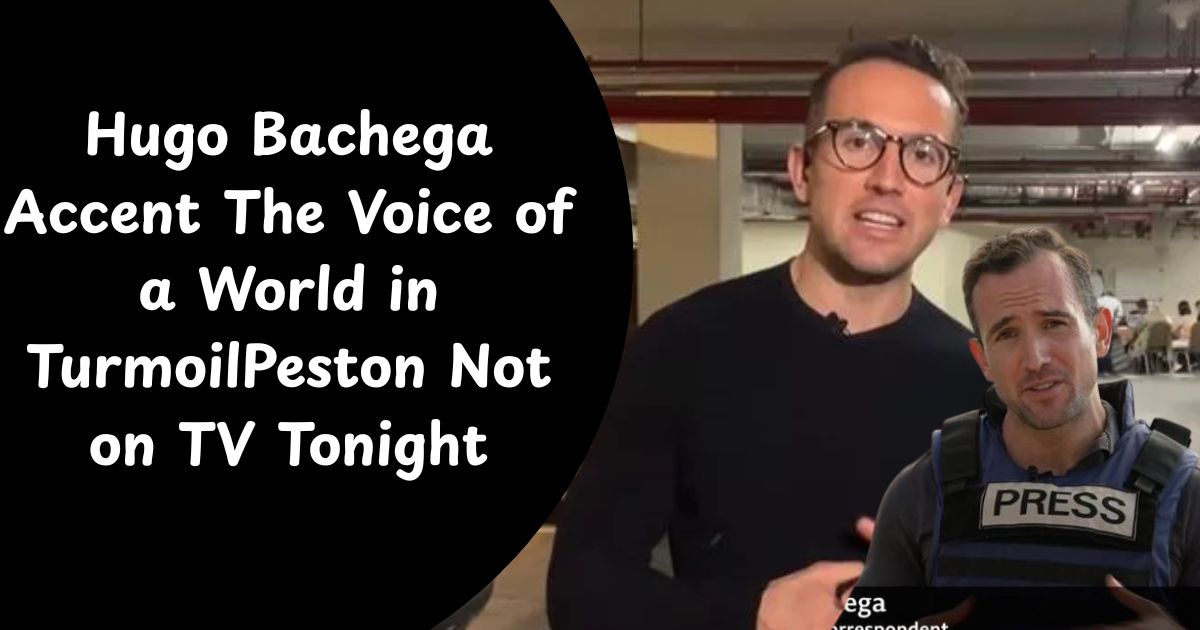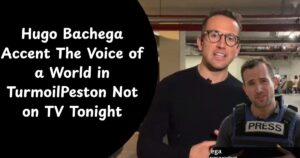In the heart of a crisis, when chaos reigns and sirens echo through empty streets, one voice stands out—calm, steady, and unmistakably Hugo Bachega. The BBC correspondent’s accent has become more than a signature; it’s a bridge across continents, carrying the warmth of Brazil and the precision of Britain.
Listeners don’t just hear news—they feel movement, adaptation, and lived stories. His voice reflects identity, history, and global perspective, transforming complex events into clarity.
In every broadcast, Hugo Bachega Accent reminds us that journalism isn’t only about information—it’s about connection, cadence, and the subtle power of a world-spanning voice.
The Man Behind the Voice: Hugo Bachega’s Music Style and Global Message
From Brazilian Streets to Global Stages
Hugo Bachega didn’t start life planning to become the voice of international crisis reporting. Born in Brazil, his journey began with Portuguese flowing through his childhood conversations. That Brazilian journalist foundation created something special—a melodic quality that makes complex stories easier to digest.
His early years shaped more than just pronunciation patterns. Brazilian culture values storytelling. It celebrates rhythm in speech. These elements didn’t disappear when Hugo learned English. They evolved, creating a unique voice in media that stands apart from traditional broadcasting.
The path from Reuters to BBC wasn’t straightforward. But each step added layers to his Hugo Bachega accent. Reuters taught him precision. BBC taught him global reach. His Brazilian roots taught him humanity.
The Rhythmic Journalism Approach
Watch Hugo report from a war zone. Notice how his voice adapts to the story’s emotional weight. During tense political coverage, his journalistic tone becomes more measured. During human interest pieces, warmth creeps back in.
This isn’t accidental. It’s cross-cultural communication at its finest. His accent works like music—it guides listeners through complex information using familiar rhythmic patterns. Americans connect with this approach because it feels authentic, not manufactured.
Key characteristics of Hugo’s reporting style:
- Measured pacing during crisis moments
- Emotional resonance without sacrificing objectivity
- Cultural bridges through vocal warmth
- Clear articulation maintaining BBC standards
The Unmistakable Sound of Hugo Bachega Accent in Socio-Political Commentary
Phonetic Analysis of Crisis Reporting
The Hugo Bachega accent combines several distinct elements. Portuguese gives him softer consonants and musical vowel patterns. British English influence provides the structural clarity BBC audiences expect. The result? Something entirely new in global news reporting.
Listen carefully during his Ukraine coverage. You’ll hear Portuguese rhythm supporting English words. It’s not code-switching—it’s accent evolution. His multilingual journalism background creates a delivery style that feels both professional and personal.
Traditional BBC voices often sound distant. Hugo’s voice sounds present. He’s not just reading news; he’s sharing experiences. That difference matters when covering human tragedy.
Emotional Resonance During Global Events
Voice as authority works differently for Hugo than traditional correspondents. His credibility doesn’t come from sounding “properly British.” It comes from sounding genuinely engaged with the story.
American audiences respond positively to this approach. We’re used to diverse voices in our daily lives. Hugo’s neutral yet warm accent feels more authentic than polished perfection. It suggests someone who’s actually been places, not just read about them.
Comparison with traditional BBC voices:
……………….
Roots and Routes: How Hugo Bachega’s Accent Was Shaped by Cultural Influence
Brazilian Portuguese Foundation
Portuguese isn’t just Hugo’s first language—it’s his emotional foundation. Brazilian Portuguese carries specific characteristics: rolling Rs, musical intonation, and expressive rhythm patterns. These elements never completely disappear, even when speaking English.
Cultural adaptation happened gradually. As a young journalist, Hugo needed to communicate clearly across language barriers. But he didn’t abandon his linguistic roots. Instead, he built upon them, creating a hybrid accent that serves multiple audiences simultaneously.
This foundation explains why his voice accentuation feels so distinctive. He’s not trying to sound British. He’s not trying to hide his Brazilian background. He’s creating something new—a truly global citizen journalist voice.
Professional Language Adaptation
Reuters provided Hugo’s first major accent evolution. International reporting demanded clarity above all else. But instead of flattening his natural speech patterns, professional training refined them.
BBC standards pushed this evolution further. British English influence became more prominent during his transition to television work. Yet the underlying musical quality remained. This balance creates his signature journalism without borders approach.
Stages of accent development:
- Childhood Portuguese foundation
- English acquisition during education
- Reuters training adding precision
- BBC refinement maintaining authenticity
- Field reporting adding emotional depth
Geographic Vocal Layering
Every assignment adds subtle layers to Hugo’s voice. War zone correspondent work in Ukraine introduced new pronunciation patterns. Middle Eastern coverage added different rhythmic elements. Each location leaves traces in his reporting in conflict zones delivery.
This isn’t conscious mimicry. It’s natural cultural adaptation. When you’re embedded with people facing crisis, you unconsciously adjust to communicate more effectively. Hugo’s accent becomes a living archive of places he’s covered.
Why Listeners Connect with Hugo Bachega’s Voice Reflecting World Turmoil
Authenticity in Crisis Communication
Media credibility relies heavily on trust. Audiences need to believe reporters understand the gravity of situations they’re covering. Hugo’s Hugo Bachega accent provides that trust through authenticity rather than authority.
His voice suggests experience without claiming superiority. It sounds like someone who’s actually stood in refugee camps, not just read about them. American audiences appreciate this approach—we value genuine experience over manufactured expertise.
Trust-building elements:
- Consistent vocal patterns across different stories
- Appropriate emotional response to human tragedy
- Professional clarity without cold detachment
- Cultural sensitivity in pronunciation choices
Global Citizenship Through Voice
Modern journalism requires global news correspondent perspectives. Hugo’s accent embodies this requirement naturally. He doesn’t sound like he’s reporting “foreign” stories—he sounds like he’s sharing human stories that happen to occur internationally.
This matters enormously for American audiences. We’re increasingly connected to global events. Having a correspondent whose voice reflects that interconnectedness makes international news feel more relevant, more immediate.
A New Standard in Journalism: Hugo Bachega’s Accents Without Borders in Music
Breaking Traditional Broadcasting Barriers
The media landscape is evolving rapidly. Audiences want authenticity over perfection. They want connection over distance. Hugo’s unique voice in media represents this shift perfectly.
Traditional broadcasting prioritized uniform delivery. Everyone sounded similar. Hugo’s success suggests audiences prefer diversity. His multilingual journalism background becomes an asset, not an obstacle.
Modern journalism benefits from this approach. When reporters bring their authentic selves to stories, coverage becomes more engaging. Information retention improves. Listener connection strengthens.
The Melodic News Delivery Revolution
Hugo’s news delivery style introduces musical elements to serious journalism. This isn’t entertainment—it’s enhanced communication. Rhythmic speech patterns help audiences process complex information more effectively.
Benefits of melodic delivery:
- Improved comprehension through rhythmic patterns
- Enhanced memory retention via musical elements
- Increased engagement through vocal variety
- Emotional connection without compromising objectivity
Misunderstandings and Bias: What People Get Wrong About Hugo Bachega Accent
Common Misconceptions Debunked
Some critics suggest Hugo’s accent is “put on” or exaggerated. This reveals accent perception bias more than linguistic reality. His speech patterns result from genuine multicultural experience, not vocal performance.
Accent and identity connect deeply. Hugo’s voice reflects his actual life journey. Questioning its authenticity essentially questions his right to sound like himself while doing professional work.
Common myths about Hugo’s accent:
- ❌ “It’s fake or exaggerated”
- ❌ “He should sound more British”
- ❌ “It’s unprofessional for BBC”
- ✅ “It reflects genuine multicultural experience”
- ✅ “It enhances audience connection”
- ✅ “It represents modern journalism evolution”
Addressing Linguistic Prejudice
Accent perception often reveals unconscious biases about authority and competence. The assumption that professional excellence requires specific pronunciation patterns excludes many qualified voices from public discourse.
Hugo’s success challenges these assumptions. His journalistic clarity doesn’t suffer from accent distinctiveness—it benefits from it. Audiences connect more strongly with authentic voices than manufactured ones.
Voice as Authority: The Hidden Power of Hugo Bachega’s Expressive Vocal Storytelling
Psychological Impact of Accent on Credibility
Voice recognition in media works differently than many assume. Audiences don’t just process words—they process vocal authenticity. Hugo’s empathy in journalism comes through his natural speech patterns, not despite them.
Research shows diverse voices enhance rather than diminish credibility when they sound genuine. Hugo’s accent signals real-world experience. It suggests someone who’s actually been places, not just studied them.
The Art of Expressive Journalism
Bilingual reporter backgrounds offer unique advantages. They understand communication across cultural barriers. They know how to make complex information accessible to diverse audiences.
Hugo’s Portuguese accent in English creates this accessibility naturally. His rhythm patterns help American audiences process international stories. His warmth makes tragic events feel human rather than statistical.
More Than Words: Hugo Bachega’s Accent as a Symbol of Societal Struggles
Voice Representing Global Movement
The Hugo Bachega accent symbolizes contemporary migration experiences. It represents successful cultural adaptation without identity loss. This resonates strongly with American audiences who share similar stories.
His voice bridges different worlds. Brazilian warmth meets British precision. Local experience supports global perspective. This combination reflects modern American reality—we’re increasingly multicultural, multilingual, and internationally connected.
Societal Struggles Through Vocal Lens
Field reporting becomes more powerful when delivered through authentic multicultural voices. Hugo’s accent adds emotional depth to coverage of inequality, migration, and cultural conflict. He’s not observing these struggles from outside—his voice suggests personal understanding.
This matters for international audience engagement. Americans connect better with stories when they’re told by someone who understands movement between cultures, adaptation challenges, and identity complexity.
Conclusion: The Future Speaks Like Hugo Bachega
The Hugo Bachega accent represents journalism’s future direction. Audiences want authentic voices telling authentic stories. They want correspondents who sound like they’ve actually lived in the world they’re reporting about.
Modern journalism benefits from this evolution. When reporters bring their genuine selves to stories, coverage becomes more engaging, more credible, more human. Hugo’s success proves that authenticity trumps artificial perfection.
His voice reminds us that global journalism works best when it sounds genuinely global. Not polished. Not manufactured. Just real.
Frequently Asked Questions
What is Hugo Bachega Accent?
The Hugo Bachega accent combines Brazilian Portuguese foundations with British English precision. It reflects his journey from Brazilian journalist to global BBC correspondent. The result is a warm, clear voice that sounds both professional and authentic.
Is Hugo Bachega British?
No, Hugo Bachega nationality is Brazilian. He works for BBC but maintains his Brazilian cultural identity. His accent reflects this multicultural background—he’s adapted to British broadcasting standards without abandoning his linguistic roots.
Why is Hugo Bachega’s accent different from most BBC reporters?
Most BBC voices developed within British cultural contexts. Hugo’s accent developed through transnational identities and multicultural life experiences. He brings Brazilian warmth to British precision, creating something entirely unique in international news coverage.
Has Hugo Bachega ever explained his accent?
Hugo rarely discusses his accent directly. He focuses on story content rather than delivery style. However, his cross-cultural communication approach speaks for itself—he prioritizes connection over conformity.
Does his accent affect how people perceive his reporting?
Yes, positively. The Hugo Bachega accent enhances audience connection and trust. American viewers appreciate authentic voices over manufactured perfection. His multicultural background adds credibility to international coverage rather than detracting from it.
Hugo Bachega’s voice proves that journalism’s future lies not in uniformity, but in authenticity. His accent doesn’t just deliver news—it builds bridges between worlds.

Chinedu Okafor is the founder and lead editor of Gozynest.com, a premier Nigerian lifestyle and celebrity blog. With over five years of experience in digital content creation, Chinedu curates engaging articles that spotlight African celebrities, fashion trends, and cultural insights.











